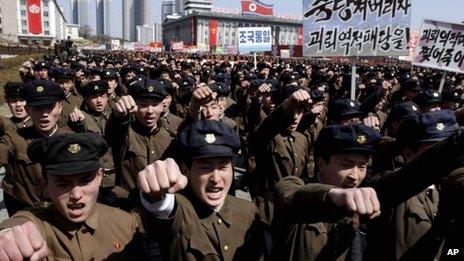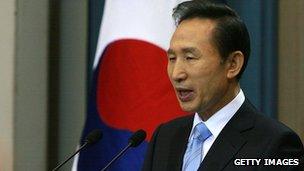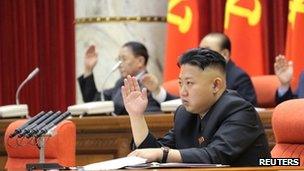Mobilising the propagandists in North Korea
- Published

North Korean propaganda typically involves shrill threats and over-the-top insults
There is nowhere like North Korea, and there is nothing quite like North Korean rhetoric.
I have followed Pyongyang's propaganda since the 1960s. It is a depressing chore, enlivened by the odd wry smile.
Their recent jibe at the "venomous swish of her skirt" - a propos Park Geun-hye, South Korea's first female president - was offensive, but it is an arresting phrase.
That is an exception. Most Pyongyang prose is leaden and shrill. Bluster and hyperbole, plus hagiography, are standard fare. They boast or threaten unceasingly, and always have done.
In the internet age, anyone - except in South Korea, which bans it, absurdly - can now read this stuff, if they have the patience.
The official Korean Central News Agency (KCNA), the Party daily Rodong Sinmun and more are online, in English and other languages. Try them.
To peruse these is to enter a parallel universe - and a time warp. Today's Pyongyang Times reads much as it did back in the 1960s.
So there is continuity - but also change. Over the past 16 months, ever since Kim Jong-un became leader after his father Kim Jong-il died, North Korea has ratcheted up its rhetoric.
What was already loud is even louder, and fierce fiercer still.
To adapt the Spinal Tap joke: if the volume was already set at 11 (on a scale of 10), it has now shot off the scale entirely.
'Silly threats'
Insults of course have been a constant. South Korea has matured beyond this now, but for years each side called the other puppets, and worse.
Yet direct threats were rare.
In April 1994, during the first nuclear crisis, it caused a shock when a Northern delegate at inter-Korean talks threatened to turn the Southern capital Seoul into a "sea of fire". That was out of order. The official who said it was reportedly fired.
But under Kim Jong-un, and especially this year, such lurid talk has become commonplace.

Former South Korean President Lee Myung-Bak has been called many names by North Korean media
Thus the current Pyongyang Times includes successive stories with headlines as such: "KPA [Korean People's Army] units on standby, zeroing in on targets"; "Not needed: prisoners, apology, surrender"; "Burn the enemy to ashes"; "Throw them into furnace"; "Teenagers vow to join army".
And then, with no apparent sense of irony: Anti-DPRK invective slammed.
Also new are silly threats to nuke the mainland US. (They cannot reach it, and they know we know that.)
Such hyperbole used to be confined to Kim Myong-chol, a Korean in Japan seen as a North Korean spokesman. Cheerful in person, Kim is famous for rabid diatribes like his 2006 effort, "War is coming to US soil", in the Asia Times, external.
But Pyongyang's own media never talked like that, until now. Has Kim Jong-un hired Kim Myong-chol?
'Swarm of rats'
The latest rhetoric has a precedent. In sheer overkill, it recalls last year's campaign vilifying South Korea's then President, Lee Myung-bak.
The North hated him as a hardliner and had long hurled the usual epithets: traitor, puppet, US running dog, etc. That is standard fare.
Early last year they cranked it up. KCNA ran five rolling mastheads such as "Let Us Cut Off Windpipes of the Lee Myung Bak-led Swarm of Rats!", linking to a set of vicious cartoons showing Lee as a rat being bloodily butchered.
They hardly needed captions, but one read: "The dirty hairy body of rat-like Myung-bak is being stabbed with bayonets. One is right in his neck and the heart has already burst open. Blood is flowing out of its filthy bottom hole."
The only word for this is schoolboy smut-porn. It began soon after Kim Jong-un took over.
The pretext, phony as ever, was Mr Lee's alleged disrespect when Kim Jong-il died.
KCNA said millions of irate Northerners were itching to march south to kill Mr Lee - and three generations of his family, for good measure - under banners such as "Blood for blood, club to mad-dog".
All this was so over the top that one feared, as currently, how it might end. But end it did.
'Fantasy substitute'
In mid-2012 the cartoons vanished and anti-Lee diatribes gave way to less personal critiques. What Pyongyang had cranked up, it cranked down. This precedent affords some hope now.
The change of tone since 2012 leaves no doubt that this is Kim Jong-un's work.
The "special statement" on 30 March that "from this moment, the North-South relations will be put at the state of war" (sic) warned all foes to "clearly know that in the era of Marshal Kim Jong-Un, the greatest-ever commander, all things are different from what they used to be in the past".
That "greatest-ever" must jar with many. Is this callow youth, with zero military experience, greater then than his grandfather Kim Il-sung, a real guerrilla who fought against Japan?
Of course not. But Kim Jong-un has to prove himself. Lacking deeds, he must make do with words.
Could talk of war precipitate the real thing? That is the risk, and vigilance is essential.
But I reckon it is a substitute. What Pyongyang is daily threatening is a fantasy. If they did any of it, this would be suicidal.
Kim Jong-un enjoys his comforts; he has no appetite for martyrdom. He is having boys' fun, like a juvenile on a computer game, even though he is playing with fire.

The heightened rhetoric may be part of Kim Jong-Un's efforts to prove himself
A neglected clue here may be a military meeting held on 28 March.
Kim Jong-un gave what KCNA called "a historic speech". No text was issued, but KCNA cited Kim Jong-un as saying that this was "not a military operations meeting".
Indeed: for the attendees were information officers from all sectors of the KPA.
So who is North Korea actually mobilising? Its propagandists, whose job is fighting talk, not fighting. I take some reassurance from this.
Finally, North Korea's English though often odd is usually correct. I hope I will not get some poor KPA sub-editor in trouble by noting a rare lapse.
On April 4 the KPA General Staff warned, as reported by KCNA and Rodong Sinmun, that "a tough-and-go [sic] situation is prevailing on the Korean Peninsula".
Indeed. They talk tough, but with any luck that is as far as it will go.